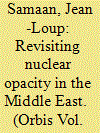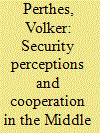| Srl | Item |
| 1 |
ID:
113793


|
|
|
|
|
| Publication |
2012.
|
| Summary/Abstract |
Foreign policies are designed to help protect a country's national interest-its national security, ideological goals and economic prosperity. Owing to the anarchic nature of the international political system, states feel a high degree of insecurity: lacking systemic guarantees of state security, war remains a legitimate instrument of foreign policy. Self-protection is the sole protection in an essentially anarchical system. While the primary objective of this article is to examine Pakistan's foreign policy, it also evaluates two approaches to international relations, idealism and realism. Lastly, the article analyses the security perception of Pakistan and the role of the military in foreign policy making. The theoretical foundation of this study is realism, because Pakistan foreign policy is a classic example of political realism.
|
|
|
|
|
|
|
|
|
|
|
|
|
|
|
|
| 2 |
ID:
126003


|
|
|
|
|
| Publication |
2013.
|
| Summary/Abstract |
This article explores a scenario of extended nuclear opacity in the Middle East that would comprise two undeclared nuclear powers: Iran and Israel. We argue that this regional spread of nuclear opacity would act as a major driver of instability in terms of conflict prevention and non- proliferation efforts. In both cases, it would demand a profound reevaluation of security policies conducted by Western countries and their allies in the region. Extended nuclear opacity in the Middle East would mean no communication channels, and no declaratory policies. It would entail no information on security perceptions, doctrines, capabilities, or targeting policies. This scenario of nuclear opacity is worth exploring as it brings new light to several critical issues in security studies. In particular it re-emphasizes a feature sometimes considered too casually which is that deterrence, if it ever is working, is not a natural state. It is socially situated and needs solid prerequisites, among them a certain level of transparency and communication. It also offers a new perspective on the logic of "nuclear hedging" and it revives the question of security guarantees from external powers as relevant means to balance threats.
|
|
|
|
|
|
|
|
|
|
|
|
|
|
|
|
| 3 |
ID:
142897


|
|
|
|
|
| Summary/Abstract |
This article will concentrate on two main themes. First, it will focus on the fears and suspicions in Middle Eastern and, particularly, Arab countries regarding the future of the Arab world and the Middle East in general and what are viewed as Western projects for that region. Second, it will discuss the political ability and preparedness of regional players to set up viable structures for regional security and cooperation. In conclusion, it will put forward some questions which, from a European perspective, seem to demand answers from today’s political and intellectual elites in the Middle East.
|
|
|
|
|
|
|
|
|
|
|
|
|
|
|
|
| 4 |
ID:
112745


|
|
|
|
|
| Publication |
2012.
|
| Summary/Abstract |
One of the recent major debates among scholars in international relations has been
the issue of the "China threat." In an attempt to shed new light on this discussion,
this paper raises a question different from the questions commonly asked thus far:
What does the Chinese public think? To understand how the Chinese public perceives
China's security environment and the rise of China, this paper utilizes the results
of a recent survey conducted in China. The findings of this paper provide sources
both for relief and concern. The Chinese public holds a relatively benign view on
China's security environment and the United States. It understands the world as
more power-balanced than U.S.-centric and shows no evident sign of hostility
toward the existing world order. However, the Chinese public's heightened optimism
and strong confidence in China's national power betray worrisome signs of selfoverestimation and preference for China's aggressive intervention in world affairs.
Considering that the CCP is increasingly relying on nationalism as an alternative
source of legitimacy, what is particularly alarming is the potential for the public's
nationalistic sentiments that could push the Chinese government to react aggressively
to international security issues, such as crises on the Korean peninsula. The Chinese
public's security perceptions analyzed in this paper suggest that the "China threat"
might be an exaggeration at this point but there are disturbing signs that confirm
the need for caution.
|
|
|
|
|
|
|
|
|
|
|
|
|
|
|
|